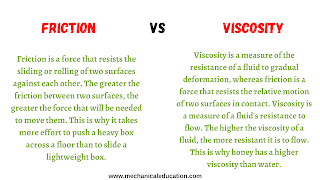Difference between Viscosity and Friction
Difference between Viscosity and Friction
What is Viscosity?
What is Friction?
The main difference between viscosity and friction are explained as follows:
Viscosity is a measure of the resistance of a fluid to gradual deformation, whereas friction is a force that resists the relative motion of two surfaces in contact. Viscosity is a measure of a fluid's resistance to flow. The higher the viscosity of a fluid, the more resistant it is to flow. This is why honey has a higher viscosity than water.
Friction is a force that resists the sliding or rolling of two surfaces against each other. The greater the friction between two surfaces, the greater the force that will be needed to move them. This is why it takes more effort to push a heavy box across a floor than to slide a lightweight box.
Viscosity can be thought of as the thickness or stickiness of a liquid, while friction can be thought of as the grip between two surfaces.
Viscosity is usually measured in terms of how much force it takes to move one layer of liquid over another (known as shear force), while friction is measured in terms of how much force it takes to move an object over a surface.
viscosity is the resistance of fluids to deforming by shear stress (slipping past one another), and "friction" is the force that resists relative lateral motion either between two surfaces or within a fluid. Friction arises from contact between two surfaces whereas viscosity can occur without contact.
Viscosity - Resistance to flow of materials based on their 'internal' stickiness properties called 'viscosity'. Viscosity depends on what speeds up or slows down molecules in a fluid, so higher molecular weight liquids have greater viscosities than lighter molecular weight liquids.
When we speak of friction, we normally think of the force resisting the motion (or deformation) of an object as it moves across a surface or contacts another object, friction may also refer to the mechanical interaction that retards or hinders movement between two objects by producing heat and reducing velocity. This action appears mostly to be dependent on the roughness (reducing as surface area increases) and humidity (increasing with humidity) of surfaces. Friction has no net push against motion so being "frictional" means simply being "resisting." Viscosity, on the other hand, is a property describing fluid resistance to flow either for laminar or turbulent flow.


















hello!! Very interesting discussion glad that I came across such informative post. Keep up the good work friend. Glad to be part of your net community. Nft projects
ReplyDelete